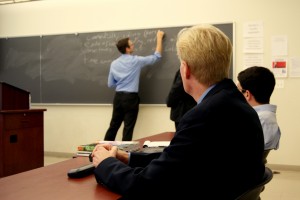
By Colleen Murphy
Correspondent
According to the College’s Wikipedia page, Mike Rithjin presided over the College for a week. This “fact” was soon changed back to the actual president, R. Barbara Gitenstein.
On the College’s current Wikipedia page a caption explains that the Roscoe West lion is “stomping the Serpent of Knowledge.” However, there is no footnote to attribute that information.
Wikipedia has been branded as an unreliable source. After all, if just anybody can go in and change the name of a college’s president, how can the pages be reliable?
These qualms were put to rest during “Too Hot Not to Touch: Using Wikipedia Editing Assignments to Foster Information Literacy and Deep Disciplinary Engagement,” a politics forum held on Thursday, Sept. 27. Social Science Librarian Terry Epperson and Information Literacy Librarian and College alum John Oliver discussed the potential use of Wikipedia as an academic tool.
According to Epperson and Oliver, with proper, active use, there is a way to use Wikipedia in a scholarly way. Wikipedia is “no longer the enemy” and there is work being done to better the pages. In fact, pages that do not stand up to Wikipedia’s standards are in jeopardy of being deleted. To meet these standards, an article must have references and citations.
“Most of the articles that are posted get deleted immediately because they don’t meet notability criterion,” Oliver said. “If I were to start a garage band today it wouldn’t meet the notability standards. That’s the classic example.”
Going into the forum, junior history major Sarah Cassin said she had the same misconceptions about Wikipedia as everyone by thinking that “it’s not serious, anyone random can come in and control the page.” The forum, however, helped her realize just how impressive Wikipedia can be, and that it has the potential to be more highly regarded.
“I mean, I get, don’t cite it. You would never cite Encyclopedia Britannica so you can’t cite Wikipedia, but I wish Wikipedia as a source wasn’t so taboo. I wish professors were comfortable with saying, ‘Go to Wikipedia and look something up,’ as you’re thinking about your research topics,” Cassin said.
“To do it right, there’s a steep learning curve,” Epperson said.
Beginning to use Wikipedia on a scholarly level requires learning HTML coding.
“I am very interested in smartsouring and opensourcing and I think that computer literacy, something as basic as HTML literacy, is something that is very necessary in the very near future just as your alphabet kind of literacy is important today,” Cassin said. “We live in a very, very digital world, at least in first world countries, and I think that it’s a very important resource. To say that print media is obsolete isn’t true, but then to say that digital media is not important is also not true and I think that we should start to enforce it.”
If interested in becoming a more active, scholarly user of Wikipedia, Epperson suggests checking out one of the many books about Wikipedia offered in the College library, going to the library’s website, or attending a meeting with an web ambassador who can teach you hands-on how to properly navigate Wikipedia.






